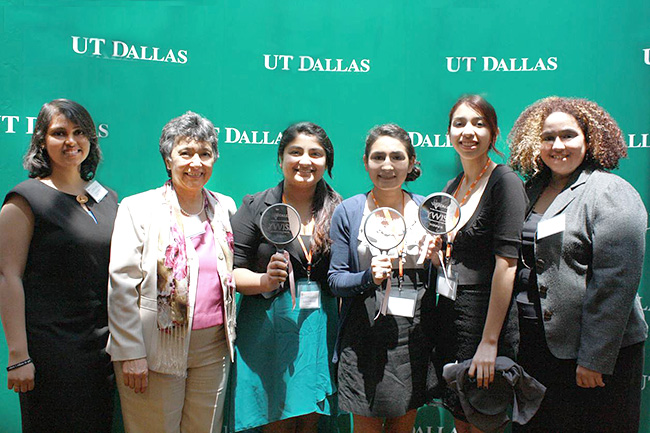For the inaugural Young Women In Science and Engineering (WISE) Investigators program, Rabina Mainali, a sophomore at Hillcrest High School Academy of Engineering in Dallas, presented a research project that addressed a topic of concern for many teenagers alike: “Which Acne Treatment can Really Zip that Zit?”

From left to right: Neha Malloli, YWISEI Graduate Assistant; Dr. Magaly Spector, Vice President for the Office of Diversity and Community Engagement; Rabina Mainali, sophomore at Hillcrest High School (1st Place-$3,000); Irma Puga Lule, junior at Irma Range Young Women’s Leadership School (3rd Place- $1,000; Jazmin Tule, junior at Irma Range Young Women’s Leadership School (2nd Place- $2,000); Narcely Ruiz, Assistant Director, Galerstein Women’s Center.
The WISE program is aimed to engage high school girls from the Dallas Independent School District (DISD) in a one-year research project, and is sponsored by UT Dallas’ Office of Diversity and Community Engagement.
“The name of the program itself identifies our ultimate goal – to encourage young women in high school to pursue careers in STEM fields by supporting them in conducting research to investigate and solve practical problems related to school, home, or the community,” said Dr. Magaly Spector, vice president of the Office of Diversity and Community Engagement.
The UT Dallas Office of Diversity advertised the program at two DISD high schools: Irma Rangel Young Women’s Leadership School and Hillcrest High School Academy of Engineering. Out of large pool of applicants, twelve students were ultimately selected for the program, which included seven sophomores, three juniors and two seniors.
Each student was assigned a UT Dallas faculty member and a female UT Dallas student mentor. With the guidance of the mentor, the student identified a potential research project, developed an experimental design and put together a formal research proposal. The investigators were required to use a project development template that incorporated the steps of the scientific method to conduct their research, and they submitted regular progress reports to demonstrate that their research projects were progressing.
The mentors met with their high school students at least five times throughout the year, providing the students an opportunity to work in labs and experience first-hand research conducted at the university level.
“We’ve been inspired to pursue careers in the STEM fields thanks to this opportunity,” said Jazmin Tule, a junior at Irma Rangel high school who researched how to charge a cell phone without wires.
The investigators’ projects spanned multiple disciplines including electrical engineering, mechanical engineering, biology, physics and chemistry.
“The name of the program itself identifies our ultimate goal – to encourage young women in high school to pursue careers in STEM fields by supporting them in conducting research to investigate and solve practical problems related to school, home, or the community.”
Dr. Magaly Spector,
vice president of the Office of Diversity and Community Engagement
The students presented their research to a panel of judges at the end of the school year. In the end, Mainali was selected for first prize. Jazmin Tule, an Irma Rangel Young Women’s Leadership School junior, took second with her project, “Comparing THPC and Fire retardant Treatments for Wood, and Analytical Evaluation,” which examined fire retardant treatments for wood. Third place went to Irma Puga Lule, an Irma Rangel Young Women’s Leadership School senior, for her project, “Optimus and Prime! The Quest for Fuel Efficiency.”
All three students received scholarships to attend UT Dallas.
“The students did an excellent job at many different stages and aspects of the program. Their research proposals addressed the investigation and search for solutions to practical problems in a highly innovative way,” said Spector. “They found many challenges during the project. For example, some of the experiments required close supervision because of the chemicals and tools needed to perform them, as well as the fact that the special labs were only available at the University.”
The WISE program was made possible by an initinal donation from Dr. Yves Chabal, head of the Department of Materials Science and Engineering in the Erik Jonsson School of Engineering and Computer Science. Chabal donated an ACS Award for Encouraging Women in careers in chemical sciences by the Dreyfus Foundation. The program was also made possible by matching funds from the Texas Instruments Foundation.